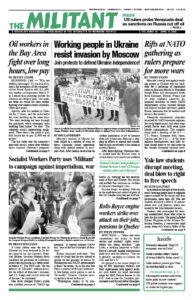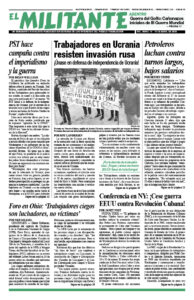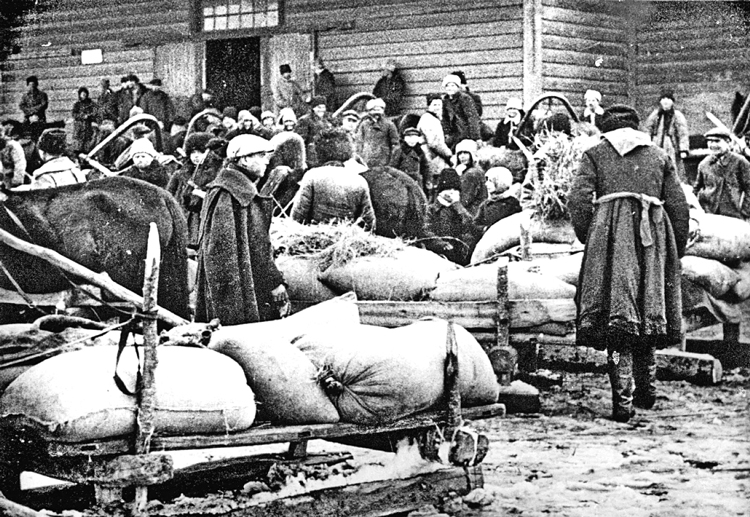As Ukrainian working people, arms in hand, defend their country’s sovereignty against Moscow’s invasion today, the Militant features Samizdat, Voices of the Soviet Opposition, which contains clandestine writings circulated in the Soviet Union that challenged the anti-working-class regime under Joseph Stalin. The excerpt below is from “Vorkuta (1950-53): Oppositional Currents and the Mine Strikes.” Author Brigitte Gerland, an East German revolutionary communist, was imprisoned for eight years in Stalin’s Gulag. She helps explain the determined thirst for national independence that spurred the fierce Ukrainian resistance to both the German Nazi and Stalinized Soviet occupations. Copyright © 1974 by Pathfinder Press. Reprinted by permission.
BY BRIGITTE GERLAND
In 1939, at a time when Stalin and Hitler agreed to divide Eastern Europe between them, the Soviet army entered Volhynia, Galicia, Bukovina, and Bessarabia. … [T]he Soviet Republic of West Ukraine came into being; and the curtain rose on a new act of the Ukrainian drama, the most tragic and bloody in history.
It would go far beyond the scope of a newspaper article to enter into details about the many wars, uprisings, and desperate conspiracies which comprise West Ukraine’s past. Suffice it to recall here that 15 million Ukrainians of Poland, Rumania, and Czechoslovakia were always an exploited minority, without any social and economic rights within these capitalist states. Whenever they fought for the most elementary rights, they invariably suffered every sort of persecution.
This is why the poor Ukrainian peasants, who had never submitted without gritting their teeth to their enemies and oppressors … greeted the Soviet soldiers as liberators, showering them with garlands of flowers and treating them with food and vodka. But the first flush of enthusiasm was soon dissipated.
Instead of the division of big estates hoped for by the Ukrainians, who owned only tiny landstrips, they were faced with forced collectivization. This collectivization was carried out — without any ideological preparation — by incapable and ignorant bureaucrats, unable to provide the necessary technical and organizational premises for the collective farms then created overnight. The population reacted with unexpected violence to these measures. Buildings were burned down, the torch was set to crops, cattle were slaughtered, and the peasants took to the impassable swampy forests of the old Russo-Polish frontier.
That is how the partisan movement was born in the West Ukraine, which to this day keeps the Soviet army busy. After a few embarrassed attempts to report the story of “kulak” sabotage, the Stalinist bureaucrats drew a curtain of silence around the fierce resistance of a sister people, disappointed in their liberation.
As the struggle against collectivization, enforced with feverish haste, grew more and more desperate, the bureaucracy resorted to ever harsher methods to extend its power over the newly conquered lands. Finally they resorted to deportations to the Siberian taiga on a big scale. Entire villages were uprooted, insofar, that is, as it was possible to round up the inhabitants. In most cases only the grandparents, the sick, and the newly born could be found; every able-bodied individual had already left to join the partisans.
Into this atmosphere, amid the blood-red glare of burning huts, the Germans launched their invasion, after Hitler had torn up the friendship pact with Stalin like a scrap of paper. The Ukrainian peasants left their forest hideouts to greet the new liberators, omitting this time the flowers, not to mention the food and vodka. But once again, full of hope, they expected, no longer the division of big estates, but the dismemberment of the hastily formed collectives that lacked machines, cattle, and above all workers.
But they awaited with an even greater impatience the formation of an independent Ukrainian state, which the Germans had promised in return for economic assistance. To their disappointment this state was never created; on the contrary, the comrades and allies found themselves suddenly branded as “sub-human Orientals,” fit only to eke out a miserable slave existence in the factories of the Master Nation conducting a victorious war. An era opened up of arrests, concentration camps, and forced labor on the territories of the German state.
All those who were able once again took to the forests, taking along some of the youth who had no desire to choose between the Ukrainian SS (storm troopers) and the German labor camps.
The struggle continued; all that changed was the face of the enemy. … Nevertheless the collapse of Germany once more rekindled hopes for an independent West Ukrainian state. The peasants were convinced that the Western powers would keep the promises they made over the radio and through their secret emissaries; and that, at long last, the eternal minority would become a nation.
But nothing came of it. The victorious Soviet army made its second entry. This time no one met them with flowers, and it wasn’t just because the tanks and armored cars had destroyed everything. For the West Ukrainians liberated from “the yoke,” the war was not over. The partisans had suffered great losses, but meanwhile new generations had grown up and the disintegrating German army left behind large stocks of weapons and munitions. At least the problem of arms seemed solved for a number of years.
Soviet soldiers now swarmed in the West Ukrainian villages, just as previously did the German soldiers. But the peasants continued to live as before in the holes they had dug amid the vast marshes, having forever discarded the plow in exchange for a rifle. For them there was no road back. …
The right of nations to self-determination was ever a part of the Bolshevik program. The bureaucratic epigones try to get around this by claiming that West Ukraine is merely an appendage to East Ukraine. …
As late as summer 1953 the Soviet government had still not succeeded in establishing tranquillity and order in the Ukraine, not even the peace of the cemetery.


